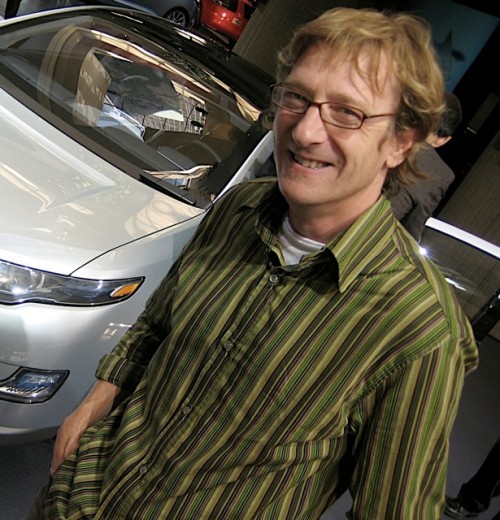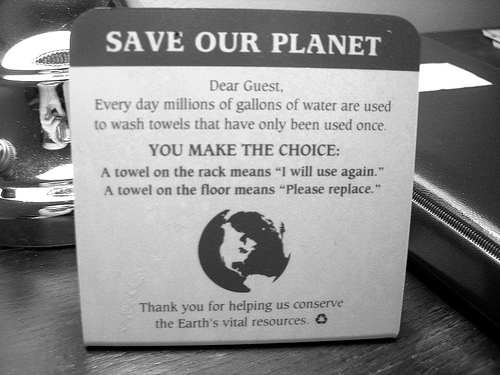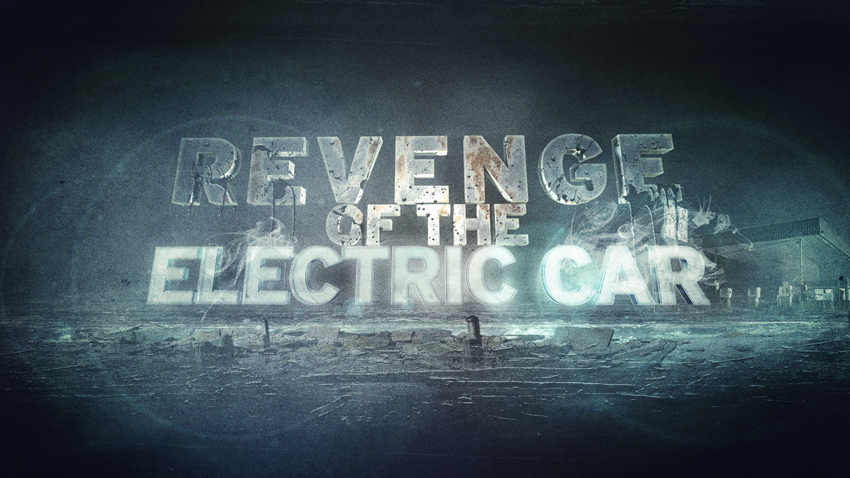 Chris Paine says his latest movie is “about change prevailing and how that happens.”
Chris Paine says his latest movie is “about change prevailing and how that happens.”
When Chris Paine’s documentary Who Killed the Electric Car was released in 2006, it was ahead of its time. Though the hybrid Toyota Prius had been around since 2001, the American public had only begun to wrap its collective head around the concept of a fully electric vehicle.
Nearly five years later, Paine is preparing another movie, Revenge of the Electric Car, and things have changed. Slated for a wide release in spring of 2011, Revenge now seems perfectly timed (if you’d like to see the trailer, head to the film’s Facebook page and click “like” — when they get to 10,000 fans, they’ll release it). Earlier this year, the nation spent months transfixed — and sickened — by the sight of oil spilling into the Gulf of Mexico. The all-electric Nissan Leaf has sold out even before it hits showrooms. And this week, GE announced it will be buying 25,000 electric cars for its corporate fleet. Said Paine: “I’m feeling pretty bullish about the electric car at the moment.”
Q. How has American consciousness shifted since you made Who Killed the Electric Car?
A. Well, the big shift is that oil prices jumped to $3 and $4 a gallon for the first time really ever, historically. People went, “Whoa, this is costing me $80 to fill up my truck! There’s gotta be another way to do this.” Since the fill-up for an electric car is usually like $10, or $5, or even less, I think it sparked a fundamental interest on the consumer level. The second thing is that everybody has this feeling that oil is not the glamour thing that it was. And then on a technical level, the battery technology improved. And suddenly there was this triangulation of forces that made this new era possible.
Q. In the promo for the movie The Dilemma, electric cars were called “gay.” Obviously it was pejorative, and it caused quite a fuss. But the fact that they’ve entered mainstream consciousness is fascinating.
A. Yep. They are showing up everywhere. The “gay” thing and the electric car — this is as old as the 1900s, when electric cars were driven by women and by doctors and other professionals, because they were quieter and because you didn’t get oil on your surgeon’s hands. And men wanting something that would project their sexuality and their aggression and their noise, those are things that we consider a stereotypical man. Make it greasy, make it dirty, make it project power.
The electric car on a subliminal level is kind of threatening, because it doesn’t necessarily have all those classic 20th-century male values attached to it. This is one of the reasons why we started making this new film: What’s going to be the approach to win the hearts and minds of the consumer as the automobile is electrified in the next 20 years?
Tesla took the approach of, you make the car as sexy as you possibly can. Price be damned. You gotta first capture the ego of the car, the raw physical beauty and color and power of the car. That’s where cars speak to people before anywhere else.
Q. What prompted you to start on Revenge of the Electric Car?
A. We didn’t anticipate how much of an impact Who Killed the Electric Car was going to have. Something about the timing of that movie — when that came out, when people started seeing it on DVD and Netflix, we got lucky and we hit the zeitgeist of people being really angry about things. I was working on other projects, but I kept getting more and more emails, I realized there’s another film here. That was in 2007.
We started picking different stories that would be emblematic of the return, the revenge of the electric car. The original idea was that this was going to be a straight horror movie. “They are back from the dead! They are really pissed! They are gonna take out GM, they are gonna take out Chrysler! They are gonna take out big oil!”
In a way there were so many things happening — whether it was car companies going bankrupt, the oil industry coming under so much scrutiny — it did feel like a classic revenge movie. The last movie was about how change gets shut down if it threatens too many people. This was going to beabout change prevailiing and why it happens.
Q. So why does the man who made a movie about electric cars live in an environmentally challenged city like Los Angeles?
A. I like to say if we can do it in L.A., we can do it anywhere. There are some cities that are totally taking the lead on this, from Portland and San Francisco to New York. But Los Angeles is also one of those cities. One of the reasons is because California is giving people incentives, they are helping early adopters to afford these cars. There’s a $7,500 federal tax credit and $5,000 in California for the first several million dollars worth of car sales.
Q. Electric cars may be better for the environment, but do you feel a conflict promoting an electric car over public transportation?
A. I definitely feel that conflict. I am all about the bicycle and the renaissance of the bicycle, and I think the light rail that’s going in L.A. is awesome. But the electric car is very easy to promote in the world of cars themselves. For better or for worse, we have a city that’s been designed around the automobile. For people who are going to be continuing to use those cars, switching them to electric is a great way to go. I would never say electric cars are better than public transportation or a bicycle, it’s just a reality. The problem with a bicycle is we’re not living in Copenhagen here.
Q. Do you think this time around, the electric car will take off?
A. Oh yeah, this is a revolution. It’s not because of the environment. I wish it was. It’s because people can make more money off selling them. They cost less money to drive, these cars. It’s like the Car 2.0 — that’s what the electric car is. The old car is not nearly as sexy as it was in 1955, or even 1985. When you run a car electrically, suddenly you have something fundamentally that is like an iPhone or iPod, rather than the clunky lawnmower you have in your backyard, which is essentially what your car is. It’s smooth. You can go 90 miles an hour on the on ramp and you sound like you are in the Jetson car. People are going to like that.
Q. It’s a little disconcerting when you don’t have noise — the noise sort of confirms that you have power.
Q. People had the same concerns [about the first gas-powered cars]. “What? A horse, it makes noise — you can’t hear a car coming! The gas car is gonna scare the horse!” Whenever we have big industrial transitions, a lot of people are nervous about how things will be different.



